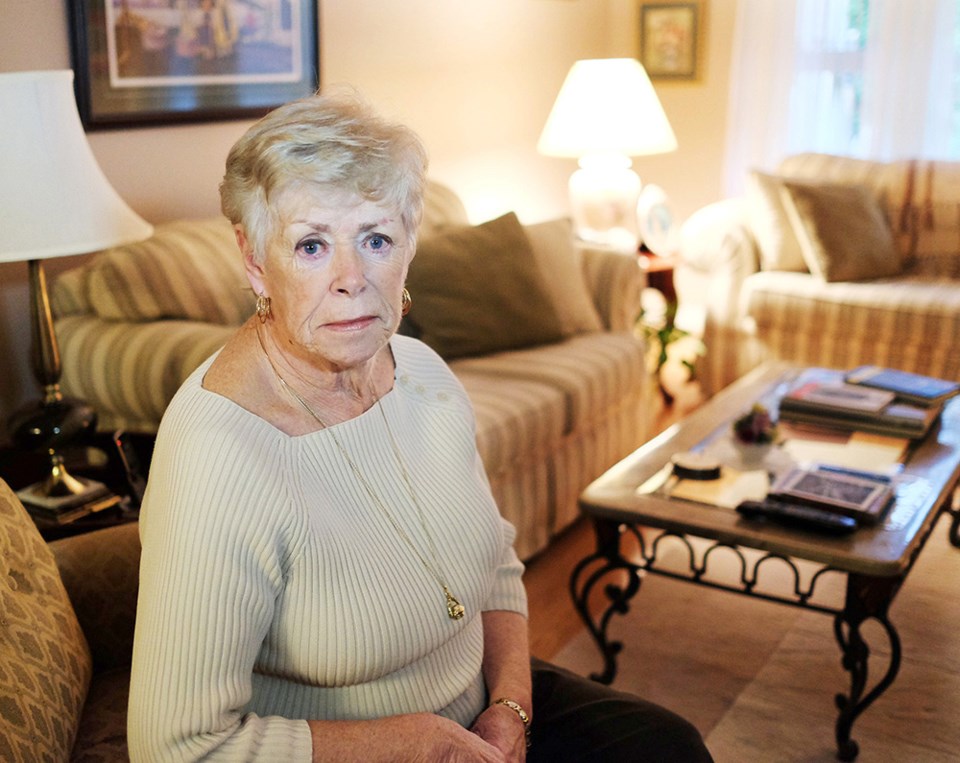Seniors and people with disabilities in a south Burnaby housing co-op have been warned of upcoming changes that will either increase their rent or force them to move out.
Tenants at Cariboo Heights Housing Co-op received notice Jan. 5 that any singles or couples living in a two-bedroom suite will have to downsize to a one-bedroom to free up space for families. If the tenants wish to stay, they’ll have to pay more each month, and if they can’t afford the increase, they’ll have to leave.
That has residents like Kay McDonald, a retired senior who lives alone, worried for herself and her neighbours.
“It came as a shock to all of us this was happening,” McDonald said. “A lot of this is affecting seniors who are on a limited income, who have been here since the place was built. It’s not fair.”
The changes take effect April 1. The new rules only apply to single tenants or couples, assuming they can share a bedroom. The problem at Cariboo Heights is there are no one-bedroom suites in the complex, so singles and couples would have to leave if they can’t afford the increase. Many are on limited incomes and already receive rental subsidies from B.C. Housing.
McDonald is on a fixed income from her pension and pays $875 for a two-bedroom suite that would cost $1,092 without subsidies.
“When you are on a pension, and all of a sudden, something like this occurs, how do you manage?” she said.
Tenants who want to keep their two-bedrooms would have to pay extra, but no one knows what those increases will be.
“They’re not even telling us what you have to pay, so how can you prepare for something like that?” McDonald said. “When we have so many homeless people, they’re putting people out on the street.”
McDonald figures about 13 units will be affected by the change.
No one from B.C. Housing was available for an interview, but the NOW received an emailed statement about the changes. B.C. Housing stated that some co-op members in provincially subsidized units are living in homes that are larger than required to meet their needs. Last April, B.C. Housing asked co-ops that receive provincial funding to make sure the larger units go to families that need them.
“As of April 1, 2015, if a household wishes to remain in a larger unit, they can choose to offset the difference by paying a surcharge for additional bedroom(s). It’s up to individual co-ops to decide what the additional charge will be,” the statement reads.
B.C. Housing can use the extra money to subsidize others who need help with housing. The agency also stated it would work with the co-op to provide other housing options for people who can’t afford the rent increase.
In all, 300 households in B.C. are facing the same dilemma as the Cariboo Heights Housing Co-op: pay higher rates, downsize or move out.
Thom Armstrong, executive director of the Co-Operative Housing Federation of B.C., said the rule has always been in place – it was part of the contract 59 co-ops signed with B.C. Housing when they were first built between 1986 and 1992.
“Everybody fell asleep at the switch, and people haven’t been enforcing it,” Armstrong said. “Everyone agrees affordable housing should be appropriately used. … But the issue here is at what price?”
Armstrong said B.C. Housing has reached out to the federation to meet and discuss the issue.
“I sense there is a lot of flexibility and willingness to examine what kinds of exceptions can be made on compassionate grounds,” he said. “I wouldn’t say B.C. Housing is moving to apply its policy exactly. I think they are now kind of in rethink mode and they are willing to be flexible.”
Armstrong expects to meet with B.C. Housing in January.



